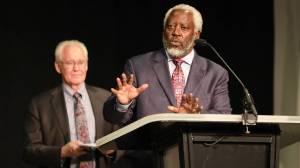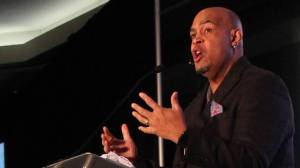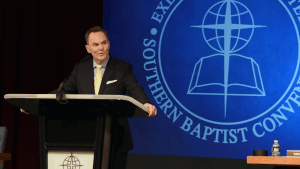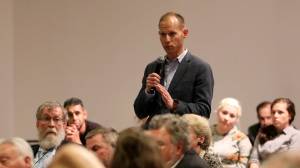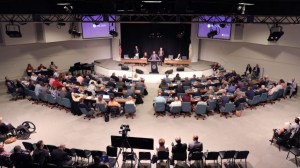In this series
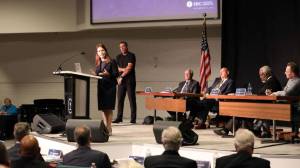
Months after the Southern Baptist Convention voted for a third-party investigation into how its Executive Committee responded to abuse allegations, leaders failed to adopt the convention’s terms for the process, deferring to ongoing negotiations between leaders and a sexual abuse task force.
The two-day proceedings in Nashville highlighted growing turmoil in the nation’s largest Protestant body and disappointed victims who had held out hope the convention would adopt a thorough outside review to address its missteps.
Still up for debate is whether the Executive Committee (EC) will comply with the convention’s directive to waive attorney-client privilege to allow investigators to obtain relevant documents from EC members and staff.
The majority of the EC voted against doing so, with several citing the “fiduciary duty” to protect the entity and the denomination as a whole.
“We grieve yesterday’s vote by the Executive Committee, who in unprecedented fashion prohibited the will of the messengers for an open and transparent investigation,” a dozen EC members—including Jared Wellman, an outspoken advocate for victims, and Rolland Slade, the EC chairman—said in a statement. “It is our opinion that the failed vote only justifies the need for an open investigation.”
After consulting with additional legal counsel who reportedly advised against waiving privilege, the EC voted to take another week to negotiate on access to privileged information. However, the group also agreed to fully fund the upcoming investigation up to $1.6 million.
“Not a win, but a step,” tweeted Florida pastor and EC member Dean Inserra, who was among the minority of EC leaders who spoke up to waive privilege. “I promise we tried.”
Southern Baptist Convention (SBC) president Ed Litton said Tuesday’s outcome “fell far short of the mandate expressed by the messengers.”
At their annual meeting in June, Southern Baptists approved forming a task force to oversee a third-party investigation of the EC’s abuse response. According to the motion, the investigation should follow “accepted best standards and practices,” including waiving privilege and releasing a public report of the findings; these specifications were seen as good-faith efforts to ensure the credibility of the process.
“If it’s not done in a way that the survivors have requested, then survivors won’t trust the results,” said Hannah-Kate Williams, who filed a lawsuit in August against the EC and other SBC entities and leaders for failing to investigate abuse allegations.
She attended the Nashville meeting along with several other survivors, wearing T-shirts with a quote from theologian Russell Moore: “Let’s Not Do Stupid Stuff.”
The move to investigate the EC came after leaked letters showed top SBC leaders—including Moore, who was then president of the Ethics and Religious Liberty Commission (ERLC), and J. D. Greear, then president of the SBC—detailing deep concern about mishandled abuse claims. Their correspondence documented ongoing concerns and gave support to the narratives victims had shared for years about their frustrations with reporting their abuse and official inaction when credible allegations against churches had been brought forward.
As EC member and Texas pastor Jared Wellman pointed out during Tuesday’s discussion, it has been a tumultuous few years for the EC, a prominent body of leaders that enacts SBC business outside the annual meetings. Former EC president Frank Page resigned in 2018 over a “morally inappropriate relationship”; longtime general counsel Augie Boto was barred from employment with any SBC entity as part of a settlement issued in February; and the EC-run Baptist Press mischaracterized the abuse of Jennifer Lyell, then a leader at Lifeway, by presenting it as an affair.
Ahead of the annual meeting, the EC initially opted to launch its own third-party investigation, but the convention voted to transfer oversight of that investigation to a task force appointed by its new president. The task force hired the same firm to oversee the review as the EC planned to—Guidepost Solutions—but emphasized that the EC can’t be the one to determine what information comes to light.
On Monday and Tuesday, the Executive Committee heard from task force chair Bruce Frank, a North Carolina pastor, and Julie Myers Wood, CEO of Guidepost. Both emphasized that the waiver of privilege was necessary to meet the terms of the convention’s motion and to signal that the investigation was trustworthy.
Ronnie Floyd, president and CEO of the EC, reiterated the group’s stance against “all forms of sex abuse, mishandling of abuse, mistreatment of victims and any intimidation of abuse survivors.” During the meeting, he encouraged members to work with the task force and Guidepost “in every way possible, but within our fiduciary responsibilities as assigned by the messengers.”
Those opposed to waiving privilege worried that the move would open up the EC and its members to litigation and possibly “bankrupt” the SBC. Joe Knott, an attorney and former EC secretary, spoke up to defend the EC’s responsibility for keeping SBC entities solvent. He favored moving forward and addressing attorney-client privilege “at the end.”
“If someone is hiding something, we want it out,” said Knott. “But there’s a way to do it without destroying our convention.” A member of the Conservative Baptist Network, he suggested the investigation would “vindicate” current EC president Ronnie Floyd.
The officers of the EC initially proposed a motion that factored in “fiduciary obligations” and wouldn’t require them to hand over privileged information. They said they believe there is “a workable path to achieve a full and fair investigation that does not sacrifice its responsibilities or jeopardize the future work of the Southern Baptist Convention.”
Many Southern Baptist pastors who saw waiving privilege as the right thing to do lamented how the deliberations seemed to downplay the importance of care for victims and transparency. Bruce Frank, the chair of the task force, repeatedly reminded the room of the significance and urgency of their decision.
Marshall Blalock, a South Carolina pastor and vice chair of the task force, said he was “deeply saddened by the spirit of the way this process has gone,” adding, “My heart also goes out to the many survivors of sexual abuse who had hoped this would pass without controversy.”
Survivor Tiffany Thigpen said the meeting was “excruciating to sit through.”
“They were not properly prepared for such a vote,” said Thigpen, who first reported her abuse to SBC leaders 30 years ago. “There were so many questions that should have been handled long before this meeting.”
The failure to waive attorney-client privilege was also seen as a blow to Baptist polity.
“Please understand the implications of this. They have just opened up the SBC to MASSIVE liability,” said Liz Evan, an attorney serving on the task force, writing for SBC Voices. “In every lawsuit against the SBC thus far, the SBC has been able to argue that we are a bottom-up organization, and therefore the SBC itself has no authority over or liability for what happens at the local church level. That ended today.”
The delay in decision on the attorney-client privilege element still leaves the possibility that the EC and the task force will arrive at a stalemate. Guidepost Solutions has until mid-May to look into how hundreds of staff and EC members addressed abuse over 20-plus years. Its report will go to the task force and then before the convention in June 2022.
Guidepost has experience with ministry investigations, as well as corporate cases, and is seen as committed to “trauma-informed care.” However, the firm has also garnered some criticism for its handling of a culture review of Ravi Zacharias International Ministries and an investigation into allegations of mishandling abuse by pastor Bryan Loritts.
Ever since the #ChurchToo movement began with testimonies from survivors like Jules Woodson and the reporting on hundreds of SBC abuse cases by the Houston Chronicle, the “watching world” has been paying attention to how the prominent denomination will address pastoral abuse and coverup in its ranks.
As a survivor, Williams said her primary reason for showing up in Nashville this week was “for the EC to know that we’re still here. … We’re still their family. We’re not going anywhere no matter how much they try to distance us from themselves—and we’re showing up in Anaheim,” where the SBC annual meeting is scheduled to be held next year.
Last week, the ERLC followed up on another meeting motion to conduct an audit and assessment around the extent of sexual abuse in the SBC. Without opposition, its leaders agreed to commission the audit and allocated an initial quarter-million dollars to the project.


